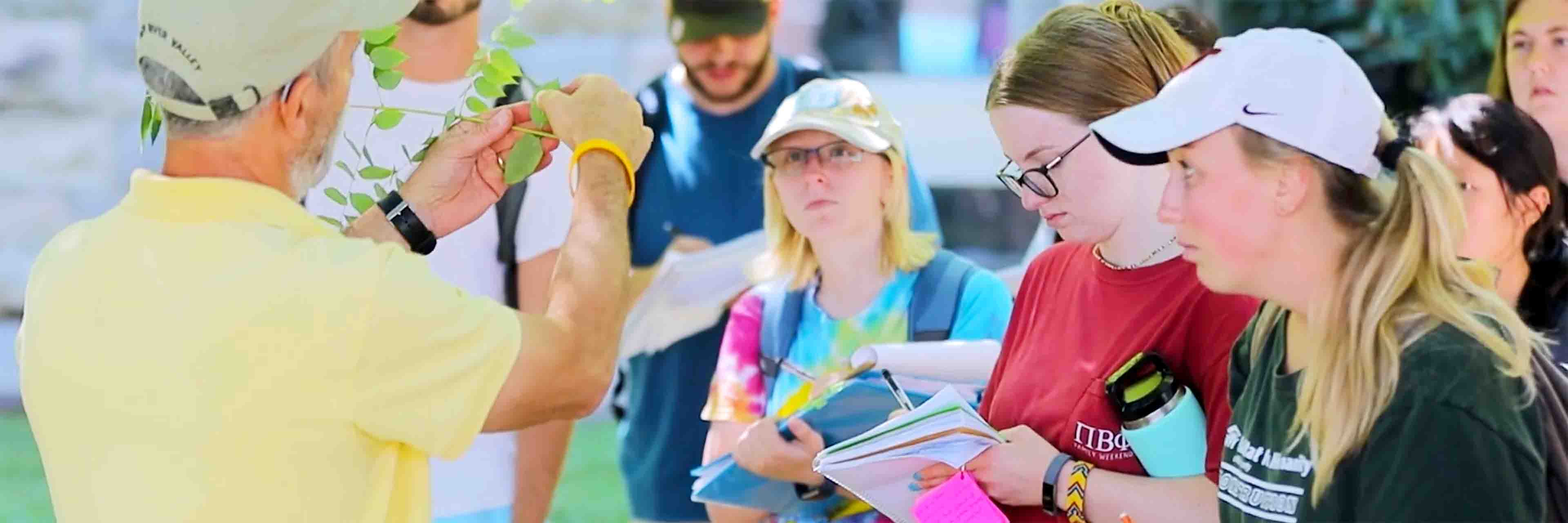Environmental conservation and society
What is environmental conservation and society?
The environmental conservation and society major is a good choice for those who like the environment and working with people. You’ll help protect the environment while planning and leading outdoor recreational activities, educating the public and getting them excited about conservation, or leading sustainability initiatives. This major incorporates scientific environmental concerns while also focusing on the human aspects of ecosystem management. It’s a blend of life and social sciences, and you’ll graduate with an understanding of stewardship and land-use ethics, as well as the communication and leadership skills needed to take an active role in engaging people with natural resources and their preservation.
Learn more about this major and the Department of Forest Resources and Environmental Conservation.
What will I learn in this major?
Students majoring in environmental conservation and society take courses in the following core areas: forest and environmental sciences, natural resources policy, environmental interpretation, human dimensions, and information technology. Due to the integrated nature of the program, students will also take courses in other disciplines such as economics, government and politics, psychology, biology, and fish and wildlife management. Students will also take courses based on which of the three tracks they choose to pursue within the major:
- Education and outreach
- Leadership and sustainability
- Recreation and tourism management
Outdoor labs provide hands-on learning
02:12
Why study environmental conservation and society at Virginia Tech?
- For all three tracks within the major, students acquire a strong background in forest and environmental sciences, as well as communication and other professional skills needed to plan educational programming and lead outreach activities.
- Students can assist with outreach activities taking place within the college and at the university to gain experience working with people of all ages. These activities include assisting with summer camps, serving as a CNRE ambassador, and educating those attending science fairs and other events.
- Internships are highly recommended and encouraged. Watch our internship videos and learn more as students talk about their experiences at the Harvard Forest, National Park Service, and other sites.
- An overseas study trip can take you to Panama as part of the Issues in Natural Resource Conservation course, where you’ll learn about natural resource management and conservation issues, the impact of climate change on tropical environments and culture, and the impacts of tropical deforestation.
- You’ll learn from faculty like Kelly Cobourn, who produces models used for protecting and maintaining lakes, and Marc Stern, who develops workshops that will empower local communities to take action against climate challenges.
- You might be interested in a CNRE or integrated Pathways minor that will provide you with additional subject matter expertise, allow you to pursue a passion, and help you stand out in the job market.
- Student organizations such as the Forestry Club and Society of American Foresters Student Chapter provide opportunities to make connections and get involved on campus and in the community.
What can I do with a degree in environmental conservation and society?
Graduates in environmental conservation and society may enter the job market or pursue a graduate degree in the field. Career possibilities are listed below, and potential employers include forest resources organizations; nature centers; nonprofit conservation centers; the Peace Corps; state, local, and federal parks; U.S. Fish and Wildlife Service; and Virginia Department of Forestry.
- Biological science technician — Carries out the practical tasks and procedures essential to completing plans and projects, such as managing habitats, conducting surveys or experiments, and computing and recording data.
- Camp manager — Manages all the maintenance and administrative aspects of running a camp.
- Environmental educator/conservation education specialist — Educates learners of all ages about natural resources and the environment.
- Nature guide/tourism operator — Specializes in a particular field or geographic area and has an in-depth knowledge about local flora, fauna, culture, activities, etc. that is shared with others who wish to learn.
- Park ranger — Protects all aspects of our national, state, and local parks, and protects and educates the people who visit them.
- Public affairs specialist — Works with the news media and the public to provide information about natural resources.
- Sustainability coordinator — Helps an organization achieve sustainability goals by advising management in relation to product and human resources development matters that touch on sustainability, as well as creating specific initiatives and programming.
- Urban natural resources specialist — Engages in planning, preservation, and sustainability efforts related to trees, other plants, and wildlife found in and around urban settings.
- Wildlife/environmental consultant — Provides services and advice to companies, agencies, and individuals on how to manage natural resources for various uses.

Attend a CNRE interest session
as part of your campus visit

Apply for admission
if CNRE is your place

Ask questions and connect
with our recruiter, John Gray Williams



